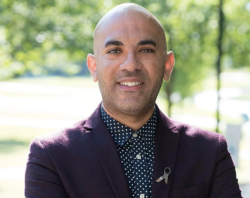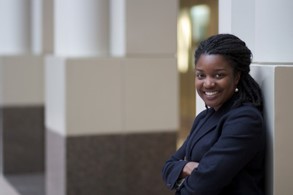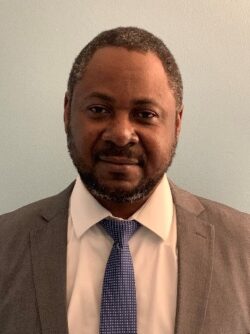RTAC Celebrates African American History Month
POSTED February 24, 2021
|Education
By Nigel Gibbs, RTAC Communications Manager
In celebration of African American History Month, the Research Technical Assistance Center (RTAC) is highlighting some of our Historically Black Colleges and Universities (HBCUs) faculty and alumni members. U.S. President Gerald R. Ford deemed February as the commemoratory month to “honor the too-often neglected accomplishments of Black Americans in every area of endeavor throughout our history.”
Academic researchers affiliated with HBCUs, which were originally established to serve the educational needs of Black Americans, are an important part of the RTAC’s research network. RTAC aims to engage these researchers in its activities, whenever possible, drawing on their valuable insights, experiences, and knowledge to increase our collective impact in international development. The featured experts in this article are academic researchers who have served as team leads on some of RTAC’s projects and have a wealth of knowledge that helps equip decision makers with the information they need to put evidence into practice.
 Angelino Viceisza, Ph. D. is an Associate Professor of Economics at Spelman College in Atlanta, GA. His work examines the microeconomics of poverty and wealth creation, particularly in developing countries. His current focus centers on (1) factors that drive financial remittances by migrants to family and friends in their countries of origin, and (2) the determinants of entrepreneurship and its impacts on wealth creation.
Angelino Viceisza, Ph. D. is an Associate Professor of Economics at Spelman College in Atlanta, GA. His work examines the microeconomics of poverty and wealth creation, particularly in developing countries. His current focus centers on (1) factors that drive financial remittances by migrants to family and friends in their countries of origin, and (2) the determinants of entrepreneurship and its impacts on wealth creation.
Dr. Viceisza’s research has been published in journals such as Economic Inquiry, Journal of Development Economics, Journal of Economic Behavior and Organization, Review of Black Political Economy, and Small Business Economics. His research on how to financially include the poor has been disseminated to academics, international organizations, private industry, and policymakers, including at the United Nations, World Bank, the HBCU Blockchain Research and Innovation Conference, and the International Money Transfer Conferences. Dr. Viceisza’s entrepreneurship research findings have been presented to donors such as the Kauffman Foundation and show how minority entrepreneurs can be included in and benefit from pitch competitions.
Dr. Viceisza faced obstacles to becoming a well-respected researcher and professor of economics. In his words, “One of the biggest challenges I have faced, is being different, i.e., not necessarily belonging. That being said, there is a lot of truth to the saying ‘we see far because we stand on the shoulders of giants.’ I am grateful to many giants!”
 Pearline M. Tyson, Ph.D. is an Adjunct Professor at the University of Maryland Baltimore County (UMBC), whose expertise includes African studies, international policy and development, education, race, diversity, and inclusion. Her research is centered around finding inequities in systems and the lasting impact of those inequities on communities of color. Dr. Tyson believes a major challenge in international development is the lack of diversity of those working in the field. Her most recent project, Current Landscape of Engagement between USAID and Historically Black Colleges and Universities, which she co-authored with Shanelle Chambers Haile (featured below), examines the barriers HBCUs have experienced in partnering with the United States Agency of International Development (USAID). Dr. Tyson believes by strengthening the partnership between HBCUs and USAID, more students and faculty from these institutions will have the same opportunities to participate in development projects around the world as students attending other institutions.
Pearline M. Tyson, Ph.D. is an Adjunct Professor at the University of Maryland Baltimore County (UMBC), whose expertise includes African studies, international policy and development, education, race, diversity, and inclusion. Her research is centered around finding inequities in systems and the lasting impact of those inequities on communities of color. Dr. Tyson believes a major challenge in international development is the lack of diversity of those working in the field. Her most recent project, Current Landscape of Engagement between USAID and Historically Black Colleges and Universities, which she co-authored with Shanelle Chambers Haile (featured below), examines the barriers HBCUs have experienced in partnering with the United States Agency of International Development (USAID). Dr. Tyson believes by strengthening the partnership between HBCUs and USAID, more students and faculty from these institutions will have the same opportunities to participate in development projects around the world as students attending other institutions.
Dr. Tyson hopes the research she and Mrs. Haile conducted, “can serve as a model for other federal agencies, local governments, and nonprofits to use in examining their own barriers, knowledge gaps and partnerships with People of Color,” thus creating a “culture of equity and competence that guides the work of everyone from the top down.”
Throughout the course of her career, Dr. Tyson described one of her biggest challenges was overcoming imposter syndrome, particularly as a Black woman in a space with few people who look like her. She stated, “When you are the only person [of color] you begin to doubt yourself and your abilities, often asking yourself whether you are good enough to be in that space. To overcome that self-doubt, I always remind myself of the legacy of the women who fought for me to be in these spaces, women such as Ida B. Wells, Fannie Lou Hamer, or Mary Church Terrell. I constantly remind myself of whose shoulders I stand on when self-doubt creeps in. I am hopeful that the next generation of Black academics won’t have to internalize that feeling because they won’t be the only one, but just one of many.”
 Shanelle Chambers Haile is currently a Ph.D. candidate at Brown University. Along with Dr. Pearline M. Tyson, she is the co-author of Current Landscape of Engagement between USAID and Historically Black Colleges and Universities. Her areas of expertise include transnational communities, global diasporas, race and ethnicity and social policy.
Shanelle Chambers Haile is currently a Ph.D. candidate at Brown University. Along with Dr. Pearline M. Tyson, she is the co-author of Current Landscape of Engagement between USAID and Historically Black Colleges and Universities. Her areas of expertise include transnational communities, global diasporas, race and ethnicity and social policy.
Mrs. Haile’s current dissertation research explores how nation states construct the notion of a homeland for diaspora groups whose ancestry is amorphous, focusing specifically on those descending from the transatlantic slave trade. Her research explores Ghana’s diaspora engagement projects directed toward the Black Atlantic diaspora, which can encourage foreign investment into the economy and allow for a new relationship with the diaspora.
In addition to Mrs. Haile’s research, she co-founded an organization called the Cultural Equity Lab, a collective of Black women from both the public and private sectors, which supports the diversity and inclusion efforts of development organizations serving global communities through cultural competency and cultural humility assessments, consultations, and trainings.
Mrs. Haile faced numerous challenges in both her academic and professional career. Like others, she found that the expertise of individuals from minority racial and ethnic groups is often undervalued and they can face a challenging road to acceptance from their colleagues. She notes, “the mentorship I have received from other Black professionals has been integral to helping me understand how to navigate institutional structures to ensure not only that I am included in important conversations, but also that my voice is heard, and my expertise and contributions are recognized.”
Isaac Marcelin, Ph.D. is an Associate Professor of Finance at University of Maryland Eastern Shore and a native of Haiti. His work focuses on financial sector development and economic growth with an emphasis on the implications of resource allocation and access to and use of financial services and products for firms and households. A significant aspect of Dr. Marcelin’s work examines the role played by political institutions in reducing market frictions to lowering barriers to external finance. His other areas of interest include public sector reform, resource mobilization, and privatization of state-owned enterprises (SOEs).
is an Associate Professor of Finance at University of Maryland Eastern Shore and a native of Haiti. His work focuses on financial sector development and economic growth with an emphasis on the implications of resource allocation and access to and use of financial services and products for firms and households. A significant aspect of Dr. Marcelin’s work examines the role played by political institutions in reducing market frictions to lowering barriers to external finance. His other areas of interest include public sector reform, resource mobilization, and privatization of state-owned enterprises (SOEs).
Dr. Marcelin is currently working on several projects in Senegal, South Africa, Togo, and the U.S. In addition to his diverse research portfolio, he provides monitoring and evaluation expertise to several international NGOs and agencies and has been published in journals such as the Journal of Banking and Finance, International Review of Financial Analysis, and Financial Research Letters.
When asked about drivers that helped pave the way to his current successes, the Haitian scholar notes that the “link between the Civil Rights movement and Blacks accessing higher education and the impact of Brown vs. Board of Education is straightforward.” He also credits “many policies, including the Fulbright Scholarship fund” for his impressive achievements in the fields of research and finance.
